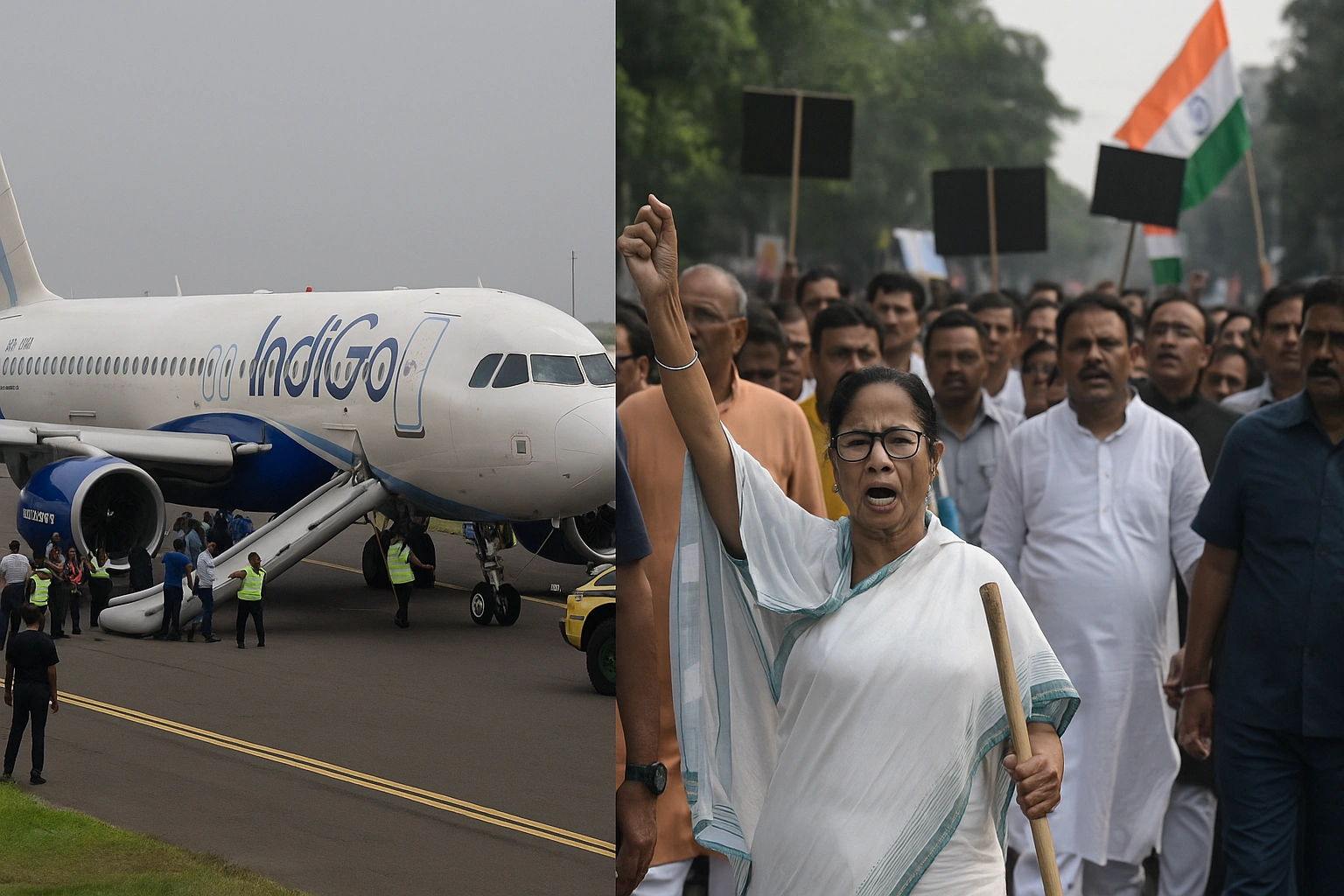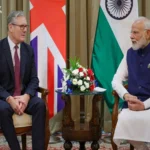Two Incidents That Resound the Bigger National Fault Lines in India
In India, which is a huge and multiethnic land, apparently unrelated incidents have an unexpected ability to refract inner fears, institutional flaws, and political divisions. Two events in the recent past, emergency landing of an IndiGo airline and massive protest by the West Bengal Chief Minister Mamata Banerjee, are some startling examples of what has been going unnoticed under the media spotlight: Attacks on aviation safety protocols in India and rising communal and regional insecurities which are being fueled by political warts.
✈️ Flight in the Danger Zone: IndiGo Plane Reveals Holes in Monitoring Aviation
In those unsettling circumstances, an IndiGo flight was compelled to land up in Mumbai in an emergency during a regular business flight between Delhi and Goa because of a technical issue which occurred mid-air. Although the evacuation of the passengers was conducted successfully, the event leaves troubling concerns regarding aircraft safety in the hottest airline industry in the world.
The civil aviation industry in India has grown exponentially in the last 10 years due to the growing middle classes and their demands to be connected to each other. But expansion has outrun regulation and infrastructure. It is inherent in the recurrent nature of emergency landings, engine blowups, and near misses, that the very fabric of maintenance and regulation is unsound beneath the shiny surface of aggressive growth.
An Indian regulatory agency, the Directorate General of Civil Aviation (DGCA), has been repeatedly accused of reactive, as opposed to preventive regulation. Under cost pressure, airline operators tend to compromise by scrimping, notably in maintenance checkups and training of the crew. The IndiGo mid-air scare is not a mere blip in operations alone it is a greater signifier of what ails aviation governance.
The need for reform cannot be overemphasized. The skies of India are getting increasingly filled with aircraft every day, and every unnoticed flaw in maintenance or regulatory carelessness can become the source of tragedy. For India, which aspires to become a global aviation hub, there is no alternative to having strict maintenance systems and transparent supervisory mechanisms.
🪧 Mamata Banerjee and Her NRC Protest from the Streets of Kolkata
Unrest was brewing in the political arena and threat loomed in the sky. Mamata Banerjee organized a theatrical rally in the streets of Kolkata protesting what she called the Bhartiya Janata Party (BJP)’s indirect NRC, a veiled reference to the deportation of migrants speaking Bengali and supposed demographic trains. Her combustible speech accused the BJP of using bureaucratic instruments as weapons to terrorize linguistic and religious minorities, specifically in eastern India.
This protest by Banerjee cannot be termed as political drama it exposed uneasiness in areas prone to identity politics, immigration, and communal challenges. Following the National Register of Citizens (NRC) introduced in Assam, misgivings have lit up West Bengal and other border states about the possibility of Bengali-speaking Muslims and Hindus being rendered stateless or harassed without reason. This has been compounded by detention camps, verification drives, and unclear documentation requirements.
The question of identity and belonging is central to the protest. Who qualifies to be an Indian? The BJP policies, both intended and perceived, have created a discourse of exclusion, and Banerjee has used that discourse to rev up the base. This confrontation is not over migration policy alone it’s over competing visions of Indian nationhood.
🔍 Understanding the Linkage of Governance Failures and Civic Mistrust
Despite these two seemingly unrelated instances one in aviation, the other in the political sphere they cluster around one reality: lack of governance and the resulting decline in public trust.
When it comes to aviation, people do not want emergency landings and dubious explanations; they want to feel safe and efficient. Similarly, citizens demand not to be discriminated against because of minority language or faith, but to be treated equally under the law. The state of India is interpreted as either absent or over-abundant, oscillating between negligence and authoritarianism.
These examples also show that even institutions the DGCA in aviation and the Ministry of Home Affairs in governance struggle to sustain accountability amidst the rising complexity and polarization at the national level. The growing mistrust in government continues to drive people to the streets or social media to express their frustrations, destabilizing the social structure further.
🛠 The Way April Will Be Worked: Consolidate Institutions and Rebuild Confidence
India is at a crossroads. It aspires to be a great power economy, digital industry leader, and a modern democracy, but these dreams are impossible without institutional equality. Any aviation incident such as the IndiGo emergency must provoke inquisition and fundamental reform. Even a protest like Mamata Banerjee’s demands soul-searching on how inclusive Indian governance really is.
The most important requirement is institutional resilience. Regulatory agencies must be strengthened, depoliticized, and held to high standards. Transparency, accountability, and social communication are no longer optional they are the foundation of safety and cohesion.
Meanwhile, political leadership must rise above divisiveness. Whether it’s intentional policy or demagogic rhetoric, inflaming communal insecurities for electoral gain is a short-term tactic with long-term harm.
🇮🇳 A Coherency-Stricken Nation
Diversity is India’s biggest asset and its biggest challenge. The crash landing of a plane and the protest march in Kolkata are reminders that both machines and societies require constant attention and recalibration.
India can only expect to pacify its streets and secure its skies through honest regulatory frameworks, political inclusion, and robust civil institutions. The era of cosmetic band-aids is over. What’s needed now is fearless governance that reinstills public confidence and builds an inclusive and safe India in the air, on land, and in the hearts of its people.







